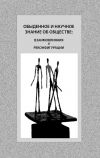Текст книги "Социологический ежегодник 2010"

Автор книги: Коллектив авторов
Жанр: Социология, Наука и Образование
сообщить о неприемлемом содержимом
Текущая страница: 35 (всего у книги 39 страниц)
* * *
PJ: Returning to the issue of exploitation. While I largely agree with characterization of prosumption on the Internet as exploitation, the counterargument exists. A lot of people who are doing prosumption – most prominent example maybe is bloggers – are doing activities, for much of which they are not getting paid, but they are earning a degree of social capital that they can ultimately leverage and monetize and make real money often. You have a number of examples of Internet millionaires – people who would be able to use their prosumption on the Internet to become famous or to be recognized as having a level of expertise because of the free labor that they contribute and ultimately gained a great deal of indirect benefits from that activities. So while of course no direct wages are being paid through that system bloggers are receiving money from the web-sites, they ultimately are able to monetize their activity and many make a living from the free content that they had originally produced.
NJ: The general point is that even if we are not being paid to use Facebook for instance there is also non-monetary value – social capital, social networks that we make. We can find jobs in the future or just get personal enjoyment. It maybe doesn’t have to do with direct wages but value can be calculated in different ways because if you only calculate value by direct wages then exploitation on Facebook is infinite.
GR: Right.
NJ: If the producers are not being paid, then the exploitation is infinite because in Marx’s sense you are only calculating value on direct monetary wages. So if we want to talk about exploitation we also need to see the other sorts of non-monetary value that are created.
PJ: I think some people haw drawn the analogy that is more useful to look at gift economies which operate on indirect reciprocity, reputation economies. The issue is that certainly exploitation is occurring with prosumption online but there’s also a lot more going on, it’s a much more complex story and to really fully understand this process you have to step outside the conventional Marxist framework.
GR: This gets into an issue getting a lot of attention here these days – an argument by Anderson about the free economy. Are you familiar with that argument there?
NP: Can you be more specific?
GR: I’ll let Nathan do it, but the basic argument is that mainly because of the Internet we have become more and more accustomed to getting things free. Lots of the services that we get on the Internet we get for nothing. I would say it costs Facebook (and many other companies) huge amount of money to provide the infrastructure. They are providing us with the service and we are not paying for it. The other side: you have lots of things that are available to you on the Internet that are free.
That creates an ethic where what you do on the Internet is free. The argument is that we have emerging here a free economy which raises all sorts of interesting issues to think about in the future and how it is that all of these people who are often doing GPS mapping in order to map the world or writing book reviews for Amazon.com and they’re doing it because they like to do it. How are they going to survive?
NJ: I think it’s a good summary. We are working on the Internet for free and we’re buying our products for free – that’s the free economy.
PJ: The other issue is this: a company will provide, say, 90% of their services for free but once you are hooked, once you like what they have to offer, in order to access the full value of their products you need to start paying, buy a premium – and then additional services are made available to you. I think that a lot of online companies have moved to that model.
GR: An interesting example of this is iPod with its apps. People send in apps and iPod decides which they are going to include and which not. Many of them are free, some they charge for. It’s a hugely growing number of these applications which greatly expand the capability of an iPod. Now the point here is that many people are creating these apps this for free but by having more applications iPod is enriched, it becomes more attractive and acquires more power in the market place. I think Google now has a version of this and has gone to a model of the «accept them all». In any case, prosumers are doing all sorts of work that is greatly benefiting. Maybe it’s a beginning of a career, maybe they can start charging for it but in many cases they end up getting nothing but pleasure that iPod is using their application.
NP: So, the question is, why do people do that? What’s in your opinion the main motivation for people to share their free products and put them online or send them to Wikipedia or any other Internet source and giving them for free for the common use?
NJ: You use the word «common» – we hear it behind the ethic of Linux and other open source software. In a «creative commons» community like Wikipedia the idea is collaborating in creating some sort of a social good. It is a very socially rich environment that people get a lot out of.
NP: This is what we call «free economy», then.
GR: Yes. There is an ideological conflict on the Internet between a capitalistic mentality and what’s called the cyber libertarian notion. Linux, for example, would be a part of this. There are people who adopt the cyber libertarian notion – that Internet should be free and controlled by the mass of prosumers – they derive pleasure from being involved in this movement. Linux succeeds as opposed to the other available systems that charge large sums of money to provide essentially the same kinds of services. So there’s kind of an ideological satisfaction for many people that is derived from this as well.
AB: I have a question that would refer to the issues that we have just mentioned – exploitation and free economy ethics. How would you threat the phenomenon of Internet piracy? Is it just a way of breaking the law or that’s a way of protesting or even bringing that free economy ethics to greater extent? For example, if I contribute to Wikipedia or Linux or to other things it wouldn’t that be quite logical for me if I expected to get music, video files, or watch online television for free as well? Just because I would like to see some feedback from corporations.
NP: Indirectly it also refers to plagiarism on the Internet – not the same subject but they intersect one another very closely – which is widely spread among students in all the countries. At the university where now I work there is a special division and a software program for tracing plagiarism and not a single student’s paper can get any satisfactory degree without getting through this program.
GR: So are you both saying that because you are doing those things free on the Internet it is ok to steal music or to steal ideas?
NP: No, this is a question, this is not an affirmation or anything like this. If Internet is a free zone, then everything is free on the Internet.
AB: And this is about the question of a new form of capitalism, I suppose, in general. A total free market which will replace the old-fashioned capitalism aimed at selling goods and at the same time exploiting people for free. That is just a question, not a thesis.
GR: Yes, I think it’s a big new issue. There are a lot of questions associated with it, of developing a total economic model where people do things for free and get things for free. That is such a revolutionary idea.
I was just in Italy. We spent a week there and we had a guy who was our driver for the week. I thought he was the employee of my host. Two or three days into the trip I asked, «How long have you been driving for so and so?» and he answered, «I don’t drive for him, I’m his friend». A couple of days later I said to my host, «It is quite unusual that this guy is willing to take a week out of his life and out of his work to drive us around all over Italy». And he replied, «That’s the Mediterranean way». It’s a version of a free economy. Maybe there are more places in the world where we have these pockets of free economy.
NP: I think it is primordial, prehistoric ethic. Italy, Greece, sometimes the south of Russia (it used to be in Russia at least) – same things. You can get a lot of services for free.
GR: Well, perhaps what we have here is a coming together of primordial performance of services for free and the Internet performance of services for free. Obviously, however, we have daunting problems in creating the free economy, the actual implementation of that. It bubbles the mind to try to think about how you would run an entire economy in that way.
NJ: I think the issue of piracy is really good to give another sort of notso-capitalist slant to what is going on with prosumption, even though I’m sure it will leverage for profit in the long run. I don’t think that prosumption is an invention of capitalist to just trick us all into working for free; with piracy or related developments we see collapsing of giant capitalist institutions in the economy such as the publishing industry or music industry.
* * *
GR: With Nathan, we ha have also been thinking and writing about efficiency versus effectiveness. Efficiency is, of course, one of the basic characteristics of Weber’s theory of rationalization and my theory of McDonaldization and certainly a basic component of capitalism as well. All of these refer to what we do or what is ought to be done if efficient kind of way.
Sometimes efficiency is effective too, but other times efficiency ends up being ineffective. We have the examples of recent failure of the American automobile companies which were operating very efficiently but not very effectively in the sense that they were not producing competitive automobiles, automobiles that were well adapted to the environmental problems we have, to gasoline prices etc.
The argument is that what we see on the Internet and Web 2.0 is the issue of effectiveness rather than efficiency. It is not efficient for ten thousand people to be involved in the creation of Wikipedia entry, a very inefficient model, right? But it is quite an effective model. I think increasingly people are accepting Wikipedia as a legitimate source. I edited a few years ago the Encyclopedia of Sociology which is 11 volumes long – a traditional model where I used 17 hundred scholars around the world to write the entries. And one of the reviews said something like: «Well, many of the entries are not as good as or no better then Wikipedia entries». I thought it was a good contrast between the older, relatively efficient model of getting 17 hundred scholars to write in their areas of expertise – efficient but maybe not so effective – and the Wikipedia model which is not very efficient but quite effective.
* * *
GR: Another idea that I have been working on with Nathan has to do with various models of surveillance and control within society. What we start with there is Michel Foucault’s notion (based on the work of Jeremy Bentham) of the Panopticon in his book «Discipline and punish». His model is the prison and the tower in the prison. The prison cells are open to the tower and you can have hundreds or thousands of prisoners who are being surveilled and controlled by a very small number of prison guards. And in fact in the end you don’t necessarily even need to have anybody in the tower because the prisoners cannot see into the tower and so they conform simply out of the idea that there might be somebody in there. That is the «few-many issue» – the few controlling the many.
Other models have recently been suggested. The second one is «synopticon» which is «the many surveilling the few». Television would be the example of that where there are many viewers who are watching popular shows. You can have millions of people watching Oprah Winfrey’s guests and they will reveal things about themselves.
A third possibility is what we are calling the «miniopticon» – that is «the few surveilling the few». We are using here Norbert Elias’ work and his idea of lengthening dependency chains. But the point is that earlier in that process you have only a few people surveilling a few people. It’s not important for our purposes.
The key point here is the forth type – what we call the «omniopticon». And the «omniopticon» is «the many watching the many». What we want to argue is that in the contemporary world – especially on the Internet – what you have and what has become a much more important model than the classic «the few watching the many» is «the many watching the many» so we see this is emerging new model of surveillance and control. Facebook would be an example here. This is an important corrective on Foucault’s perspective.
AB: If we talk about the last example, Facebook, even despite the fact that still the many are watching the many another premise is implicated – the Foucauldian premise – which is that the few are watching the many. So it is argued sometimes that Facebook reveals too much personal information from the users which they upload to their profiles to secret services.
GR: That is a good point because what you are really saying is that we basically create here four types but of course in the real world you have a combination of types. So I think it is entirely possible that we have «many-many» model going on and the few out there who are watching the many-many kind of model. I think that would be a useful addition to the paper we are working on.
AB: That also might be about the Frankfurt School problem between what is pronounced and what is true, what is behind. As a pronounced model you can have this «opmiopticon» translated to lay people while in fact you have classical panopticon.
NJ: But I think it is important not to fall back into this. We all should be wary of very important critiques about how panopticon surveillance exists on Facebook. All those critiques are very important and a lot of people are focused on them with respect to the Internet. But what has not really been written and what has not been focused on is finding issue with the «omniopticon». Again – not to say we should not talk about government or corporate surveillance on Facebook, but I think there is a new problematic, a new potential for new theorizing on «the many are watching the many».
* * *
AB: Just a short note about «effectiveness versus efficiency». If we discuss effectiveness it is important to bear in mind which sphere we take – for example the Italian man Professor Ritzer was talking about was effective in gaining social capital but he was not effective in gaining money. And the same can be said about Wikipedia: you can be effective in providing useful knowledge for all the people around the world but it is not effective to give money to those who contribute to this project.
GR: Yes, fair point.
* * *
GR: One of the things we are interested in is the transition from Web 1.0 to Web 2.0 and the implications of that. It relates to the ideas that I develop in «The Globalization of Nothing». The general argument that we make is that Web 1.0 was dominated more by what I call «nothing». «Nothing» is any social form which is centrally conceived, centrally controlled and lacking in distinctive content. The classic Yahoo page that is closer to the «nothing» end of the continuum is centrally controlled by Yahoo, centrally conceived by Yahoo and lacking in distinctive content – and historically, at least in the early years of Web 1.0, everybody got basically the same page. On Web 2.0, it seems to me, there is much greater possibility for the existence of «something» – on Web 2.0 we can see the development of many more social forms that are more indigenously conceived by the people who happen to be involved in, controlled by those people and producing as a result distinctive content rather than the homogenous content that gets produced on Web 1.0. In that sense that is a rather optimistic view of social change and optimistic view of Web 2.0 as opposed to Web 1.0: Web 2.0 is more a domain of «somethingness» and on Web 2.0 there are much greater possibilities for the creation of it than on Web 1.0.
AB: If we treat Web 2.0 as a positive transmission from its previous variant, do we face the problems we have just mentioned – social control and the problem of manipulation? I guess we should take both sides of the coin in our analysis.
GR: What I always like to do is to look at a social phenomenon from a variety of different theoretical lenses and I think we need to be wary of adopting one overarching lens and always seeing things from the point of view of that lens. In terms of what we talk about today we get rather contradictory conclusions: on the one hand, Web 2.0 is an exploitative domain and on the other hand it is also a domain in which we see more «somethingness» that «nothingness». So you have simultaneously a critical orientation and a laudatory orientation. For me, social theory is like a huge toolkit and I think from a student’s point of view what is desirable is to know as much about the tools that exist in that kit as possible. I suppose I should do a TV show, «Theorizing anything».
NP: But behind this joke, I suppose, there is a very serious content because being a theorist today in sociology means that, basically speaking, in my opinion one has to have an interpretation for almost everything in the world. This is in what sociological theory is today how I think. I am not sure you have the same attitude, perhaps you do.
GR: Yes, I always try to make sense out of whatever I am encountering and usually I fall back on my own theoretical ideas or other theoretical ideas, or develop new ones. There are always new developments, vast warehouse stores of ideas that you can use to think about various things or to come up with new ideas. The other thing about being a theorist is that you can theorize as long as you have two or three brain cells left – and maybe beyond that. I may have gone beyond that.
* * *
TR: Have I understood correctly that consuming process in IKEA or Facebook examples is a free kind of labor that actually brings pleasure just because people do it for themselves so they are, in Marx’s terminology, not really separated from the result of their work and the labor process?
PJ: I would say that what you bring up is that prosumption to some degree may overcome alienation. I think another important thing that we have not brought up in the conversation about prosumption is the fact that visual content is infinitely reproducible. I think what is interesting about the way that economy works on the Internet is that you can actually produce something for your own enjoyment not being separated from the product of your own labor. But then everyone else can come along and simply copy that million times, infinitely. For example, with the iPod and iPhone apps, you can make a program that is useful to you and then Apple can come along and reproduce it and leverage value from that product. And I think that understanding the aspect of infinite reproducibility in conjunction with the idea that labor is less alienated has a lot of potential for explaining why prosumption has exploded in the context of Web 2.0.
NJ: As a possibility, we can have exploitation and not alienation – maybe what we have is that people are not alienated and not moved from their work but they can still be exploited.
GR: I would answer that you need to distinguish between structural realities and attitudes and feelings. You may feel not alienated, you may feel not exploited, you may feel really good about what you are going, but from a structural point of view – Marx’s definition of alienation was really a structural definition – you lose control over, you get separated from that. The same thing with exploitation – these are to me concepts which relate to the fundamental structure of capitalism. And I think those fundamental realities continue to be in place while more and more people are putting their IKEA furniture together or writing on their Facebook wall and things like that. They are feeling good about it but at the same time Facebook’s market value goes up a billion dollars a year and IKEA is more and more profitable. So you feel good and they are growing richer. One of the ways they are growing richer is what you are doing for them. It is a great system from a capitalistic point of view because we are all joyfully enriching Facebook, Apple Computer, IKEA. If I could only get you all to write my books for me and apply this that way I could become wealthy myself.
AB: That is once again about compensatory mechanisms which can help to overcome exploitation. Even if the system is really exploitative you may still have a lot of joy and if you are copied millions of time – doesn’t it mean that you are popular, that you have gained social capital?
NP: I would say that what we are discussing today is the post-consumer society type of free economy where people would be contributing to the common market or different kinds of markets without having such a selfconsciousness of being exploited. It is the free donations of products and free consumption – but only under the condition that the economic and social security of people is guaranteed by the society. Otherwise I cannot imagine it to be something real. The question is whether we have enough evidence of those new-coming phenomena and the key issue is what is going to be after the economic crisis – is it going to be a new stage of development of the consumer ideology and consumption, a post-consumerism type of thing which I think you, George, is describing as the totality of prosumer culture where everyone will be contributing to consuming from the same reservoir.
GR: Yes, that is right. I think there is a lot of evidence that there is a new world emerging here. Your point is a good one, that is if we are all doing this stuff for free that might work if we lived in a society where everyone was being cared for at some at least minimum level by the society but that is certainly not the case in the United States – we don’t have that kind of ethic. We have a real contradiction here in the sense that lots of people often do things for free not really knowing how they are going to profit from it but doing it nonetheless because they like doing it. But it is in the context of the society which is not going to be there to protect them. This is another dilemma that we need to address in the future. This is all exploding around us – we are all part of it, we can all see it very clearly, and so we all can analyze this as we go on a day-to-day basis.
Правообладателям!
Это произведение, предположительно, находится в статусе 'public domain'. Если это не так и размещение материала нарушает чьи-либо права, то сообщите нам об этом.








































